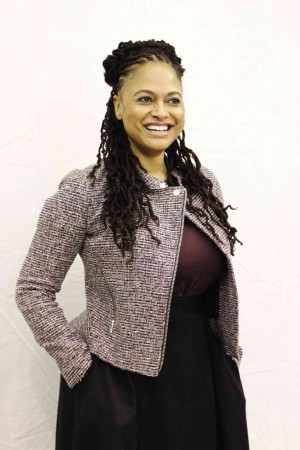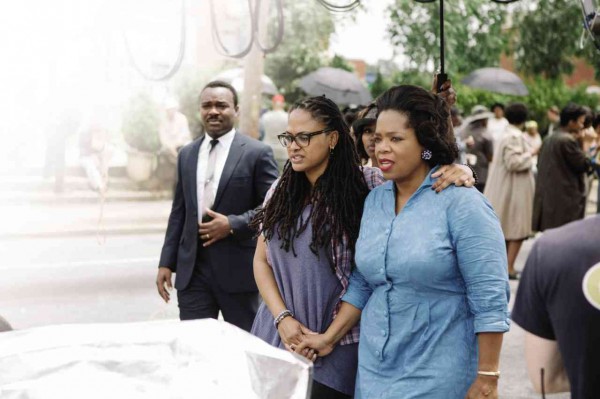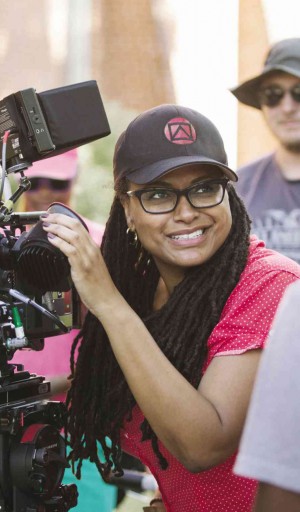‘Selma’ director hopes to inspire girls, from PH to Brazil

DUVERNAY worked in public relations where she observed the lack of funding and support for black indie films. Photo by Ruben V. Nepales
LOS ANGELES—Ava DuVernay, who made history as the first black woman to earn a Golden Globe Awards nomination for best director for “Selma,” wants to inspire girls, from the Philippines to Brazil. The trailblazing former publicist, whose film about Martin Luther King Jr. recently landed an Oscar best picture nod, brought this up when asked about the figurative crossing of the bridge in her life (the reenactment of “Bloody Sunday” in 1965, when armed officers attacked civil rights demonstrators crossing the Edmund Pettus Bridge in Alabama is a crucial scene in her movie).
“My bridge crossing is getting out of thinking in a small, limited way as a young girl from Compton (California),” said the spirited filmmaker. “Compton is an inner city. As a young black girl, I never saw anyone making films, especially women. So the idea that one can see more for themselves than anything they’ve ever seen before—that really captured my imagination.
“I see that with Oprah (Winfrey) as a young girl from Mississippi. So I always just imagined girls from all over the world or people with brown skin from all over the world, whether it’s the Philippines, Sri Lanka, Brazil or Africa—seeing something they’ve never seen—people making films, taking control of their images… that was a bridge for me to cross because I never saw it. I hope I can be that bridge for other people.”
Socially conscious
“Images are so important,” stressed the socially conscious writer, director and producer. “I know what they did for me living in the ’hood. They saved me. Even the conversations they were having [in the films] saved me. They helped me change the way I saw myself. I know that they helped the way that people see me. A lot of people don’t know black women in their lives. They don’t know black people intimately.”
Windows
It’s no surprise that Ava, who also made history as the first black winner of the best director award in the Sundance Film Festival (2012) for “Middle of Nowhere,” has a special affinity for foreign-language films.
Ava shared, “I love foreign films. I consume them ferociously. Foreign films are important; they are our windows into each other. I really feel like an activist around these images so it’s important that they are diverse. It’s so important, that we as Americans [shouldn’t] only watch American films and that… Americans don’t say that black films do not travel overseas, or that no one’s interested. How is anyone ever going to understand us?
Dealing with obstacles
“Films are really important to me. That’s how I deal with the obstacles—I know that the work we’re doing means something. Someone’s going to see it. They may not see it in the theater. They may see it on DVD 10 years from now, or when it goes to free television on a Saturday afternoon when they are folding clothes or something. It will still mean something. So I hope to let my movies do the talking for me. We’ll see.”
The former publicist (she observed the lack of funding and support for black indie films through the course of her public relations work) has found an ally in Oprah Winfrey, who is one of “Selma’s” producers.
Pearls of wisdom
“I talk to Oprah every day, which is nice to be able to say,” Ava said with her radiant smile, her big beautiful eyes sparkling. “A year ago, she didn’t know who I was. Now, I get to talk to her every day. She gives me great pearls of wisdom. What you imagine she would be, she’s that—times 100. Very giving, very focused and also a very powerful entrepreneur. Whenever I needed something, I’d ask her. Bam! I’d have it.
Final cut
“It’s not just about money. It’s about helping people understand that she was helping guide my vision. The film that you saw, for better or for worse, is my vision of the film. It’s my final cut. A lot of filmmakers these days don’t get final cut.

FROM left: David Oyelowo (as Dr. Martin Luther King Jr.), director Ava DuVernay and Oprah Winfrey on the set of “Selma”
“This is only my third film and my first studio film. I’m a woman filmmaker, a black filmmaker. Oprah cleared a path for me to follow behind her; I learned a lot from her. What I learned from her is that I have a bit of a temper. Oprah is very calm; she would just say, ‘Breathe, Ava, just breathe. Let’s just breathe together.’ I say, ‘I don’t want to breathe together. I want to be upset.’ She’s calm, classy, very elegant and exquisite.”
Another ally
Ava’s other close ally is her brilliant lead actor, David Oyelowo. She said, “When I decided to become a filmmaker, I wasn’t thinking about Dr. King at all. I didn’t think about this film until David Oyelowo brought it to my attention. That was just one year ago. When something takes over your whole imagination and you can’t do anything but that, I think they call it being obsessed. I started work on the script and the film, gathering together that very large cast and focusing on the place of Selma which is in Alabama, where my father is from. I know that place very well.
Not an imitation
“Oh gosh, he was exhaustive,” Ava described David’s research in preparing to play the American hero and civil rights leader. “He watched everything. He’d been on this project for four or six years, so by the time I got to him, he was very much ready to go. We watched a lot of things together, read a lot, debated a lot. We really tried to figure out this performance in terms of how we don’t want to mimic. We don’t want an imitation. It’s really about getting Dr. King’s spirit and essence. Who wants to do a bad imitation of anybody? This role could have easily fallen into that.
“He broke down the consonants. He’s a nerd. I would call him and say, ‘So how’s it sounding? Let me hear some King.’ He’d do a little King and I would say, ‘Yeah. Almost there. Not quite there.’ He’d keep working on it. This was a lot of personal work between the two of us. We’re dear friends.”
Daunting task
Ava declared, “It’s easy now for people to say, ‘Oh, you made a Dr. King movie.’ It was a daunting task at the outset. There’s never been one done with King at the center. He’s such an iconic figure with a voice and a demeanor that everyone knows. How do you deconstruct that and make it real and rooted, and feel like you’re getting underneath the man and not just a statue?”
Oscar snub
While Ava and David were nominated in the Golden Globes’ best director and actor categories, respectively, they were snubbed in the Oscars. “Selma” snagged two Academy nods, for best picture and best original song (“Glory” by Common and John Legend).
Still, Ava reacted with a hopeful statement: “Happy Birthday, Dr. King. An Oscar gift for you. To ‘Selma’ cast + crew led by our miracle, David Oyelowo! To Common + Legend! Kudos! March on!”
(Email the columnist at [email protected]. Follow him at https://twitter.com/nepalesruben.)















